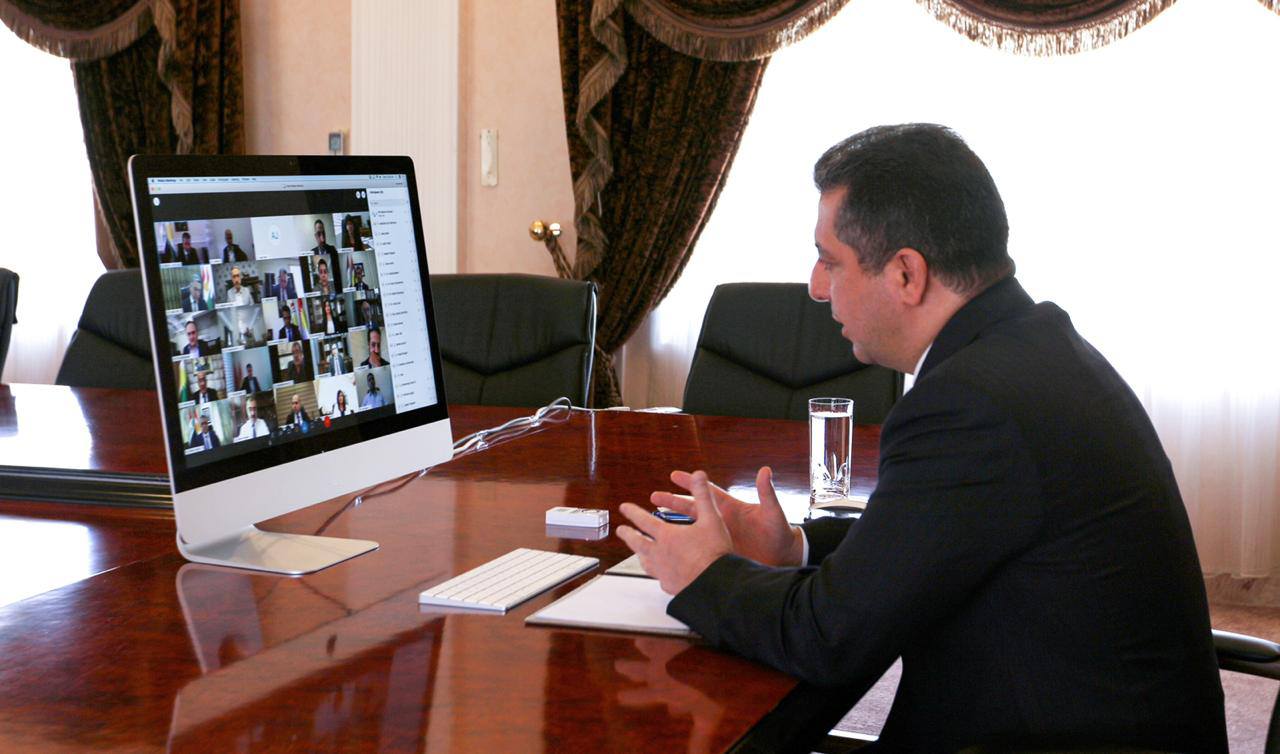KRG discusses economic, health situation in Kurdistan Region

ERBIL (Kurdistan 24) – On Monday, the Prime Minister of the Kurdistan Region, Masrour Barzani, chaired a virtual meeting of the Council of Ministers to discuss the current economic and health situation in the region, according to a press release from the prime minister’s office.
The Council’s discussion included the question of how to proceed with salary payments to employees of the Kurdistan Regional Government (KRG), and the Council decided to distribute salaries “as soon as possible” in proportion to the government’s income.
The decision follows an understanding recently reached between the KRG and the federal Iraqi government, which was revealed late on Saturday, when Barzani announced that Baghdad had agreed to a "partial restoration" of the region's share of the national budget.
Read More: Iraq agrees to send Kurdistan part of its budget: KRG
That announcement signaled that the two sides are approaching an understanding on bilateral disputes regarding finances, as both parties have suffered serious cuts in income, caused by the coronavirus pandemic, which has hurt both their economies domestically, as well as caused a sharp decline in oil prices, because of the international economic slowdown.
The Council further explained on Monday that it would pay the salaries of its employees at an “appropriate time” and in a “just manner,” based on the government’s revenues, both oil and non-oil, plus the money from the budget that Baghdad has agreed to send.
Oil and finances have been major sources of friction between the central government in Baghdad and the KRG since the region began to export its oil independently. The disagreements reached such a high level in 2014 that the then-Iraqi government actually cut the region’s share of the federal budget completely.
Baghdad’s move caused a major financial crisis for the Kurdistan Region, as it also had to mobilize to fight the threat caused by the sudden emergence of the terrorist group, ISIS, which, at its peak, controlled one-third of Iraq and threatened Erbil.
’Kurdistan Region is in a dangerous situation’: coronavirus spreads
In Monday’s meeting, the Council also expressed its concern regarding the recent spike in coronavirus cases in the Kurdistan Region.
“The Kurdistan Region is in a dangerous situation,” the Council stated, as daily infections and fatalities are on the rise across the region. So far, the region has had 21,660 confirmed cases.
On Monday, Kurdish authorities announced that there had been 24 deaths over the past 24 hours—the highest death toll yet recorded in the Kurdistan Region in one day.
Read More: COVID-19: Kurdistan Region, again, records highest death toll in past 24 hours
The Council added that the basic cause of the recent spikes is the “non-adherence to the precautionary measures” among the people of the Kurdistan Region. That has resulted in the number of cases in the region reaching a “dangerous level.”
“We ask citizens to adhere to health measures” as government agencies continue to execute these measures, the Council stated.
International Problem
This is a common problem in much of the world. Some countries, particularly smaller Asian countries near China, like South Korea and Taiwan, have been relatively successful in dealing with the virus.
Both the governments and the people in those countries have experience dealing with viruses emerging from China, like the SARS (Severe Acute Respiratory Syndrome) virus that appeared in late 2002.
However, elsewhere such experience is lacking, and many governments, including in the US and Europe, were slow to recognize and then deal with the problem. Moreover, significant elements of the population never really followed the health guidelines or else did so, but have now seized upon the apparent opportunity to return to their accustomed activities.
Many Britons, for example, are taking their summer holidays abroad, despite the uncertainties and risks associated with the pandemic. Last week, some 160,000 British holiday-makers were in France, when they were met with an unwelcome surprise from their own government.
As France has relaxed its strict lockdown measures, coronavirus cases have spiked. So late on Thursday, the UK government announced that anyone returning from France after 4:00 AM on Saturday—less than 48 hours following the announcement—would be subject to a 14-day quarantine, with a stiff penalty, ranging from 1,000 to 3,200 pounds, for any violations.
The abrupt deadline left many Britons scrambling “in a frantic rush for plane, train or ferry tickets costing hundreds of pounds,” the BBC reported.
The problem is, thus, not unique to the Kurdistan Region, but people pay a price—sometimes it is their lives—by not treating the coronavirus, the worst global health crisis in a century, with the appropriate seriousness and concern.
Editing by Laurie Mylroie
